 President Trump has signed the Broadband DATA Act, and with the signing, the act now becomes law. The act aims to improve FCC broadband availability data, which has been widely criticized for inaccuracy, and it’s an important development as policymakers strive to make high-speed broadband available to all Americans.
President Trump has signed the Broadband DATA Act, and with the signing, the act now becomes law. The act aims to improve FCC broadband availability data, which has been widely criticized for inaccuracy, and it’s an important development as policymakers strive to make high-speed broadband available to all Americans.
In a press statement, however, FCC Chairman Ajit Pai cautioned that the FCC would not be able to implement the act unless Congress quickly provides the commission with “the appropriations necessary.”
Pai said the FCC has “warned for some time” about the funding need and noted that “if Congress does not act soon, this well-intentioned legislation will have the unfortunate effect of delaying rather than expediting the development of better broadband maps.”
The act specifies that the FCC may not use Universal Service Fund money to implement the act. But a senate press release about the Broadband DATA Act signing doesn’t reference any plans for appropriating funding to support the requirements of the act, other than referring readers to the act, which states that the commission may recover costs associated with implementing the act to the extent provided for in an appropriation act.
As Telecompetitor previously reported, the act calls for the creation of an address fabric that would include the geolocation of all addresses in the U.S. USTelecom has estimated the cost of creating that fabric at about $8.5 to $11 million, with annual updates costing $3 to $4 million. However, those estimates do not include data collection costs or other costs of implementing the act.
Broadband DATA Act Signing
One thing that is included in the senate press release about the signing of the Broadband DATA Act is a summary of key points of the bill. According to the release, the bill will:
- Require the FCC to collect granular service availability data from wired, fixed wireless and satellite broadband providers
- Set strong parameters for service availability data collected from mobile broadband providers to help ensure accuracy
- Permit the FCC to consider whether to collect verified coverage data from state, local and tribal governments, as well as from other entities
- Create a process for consumers; state, local and tribal governments and other groups to challenge FCC maps with their own data and require the FCC to determine how to structure that process without making it overly burdensome on challengers
- Establish a crowdsourcing process to allow the public to participate in data collection
- Strengthen enforcement against providers that knowingly or recklessly submit materially inaccurate broadband data
- Require the FCC to use the newly-created maps when making new awards of broadband funding
Image courtesy of flickr user Sean MacEntee


